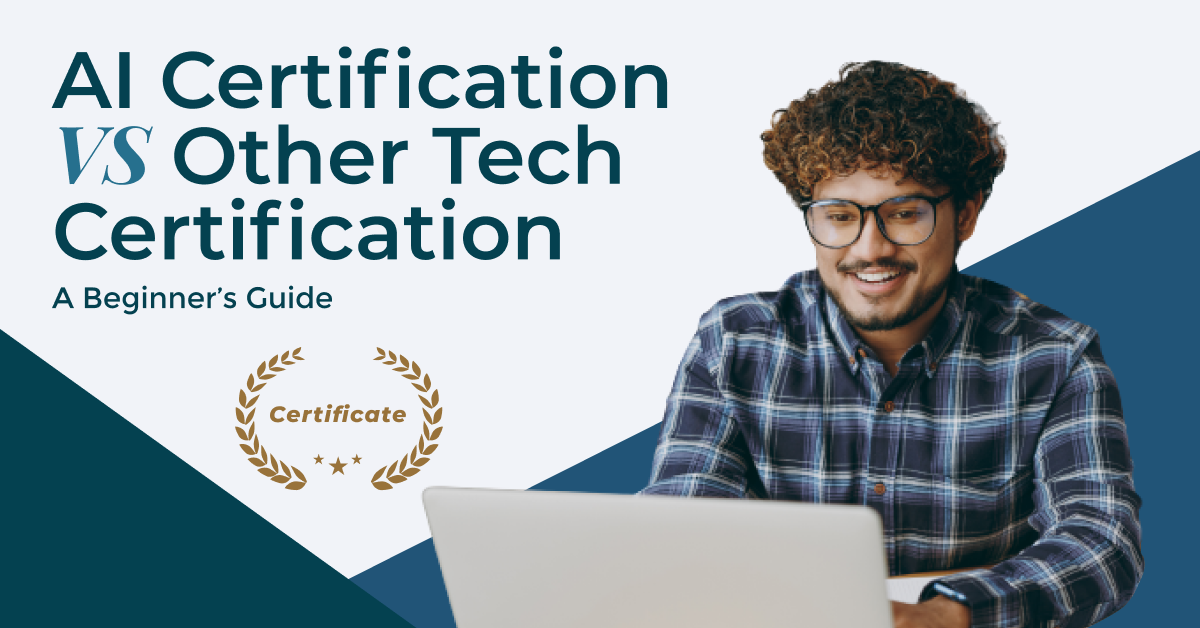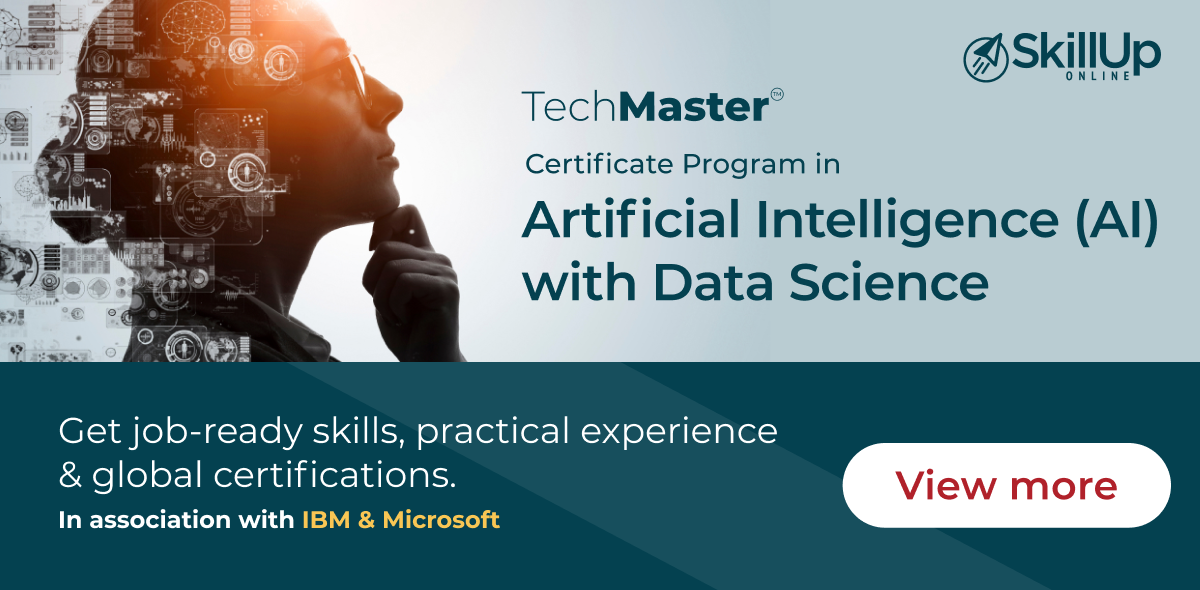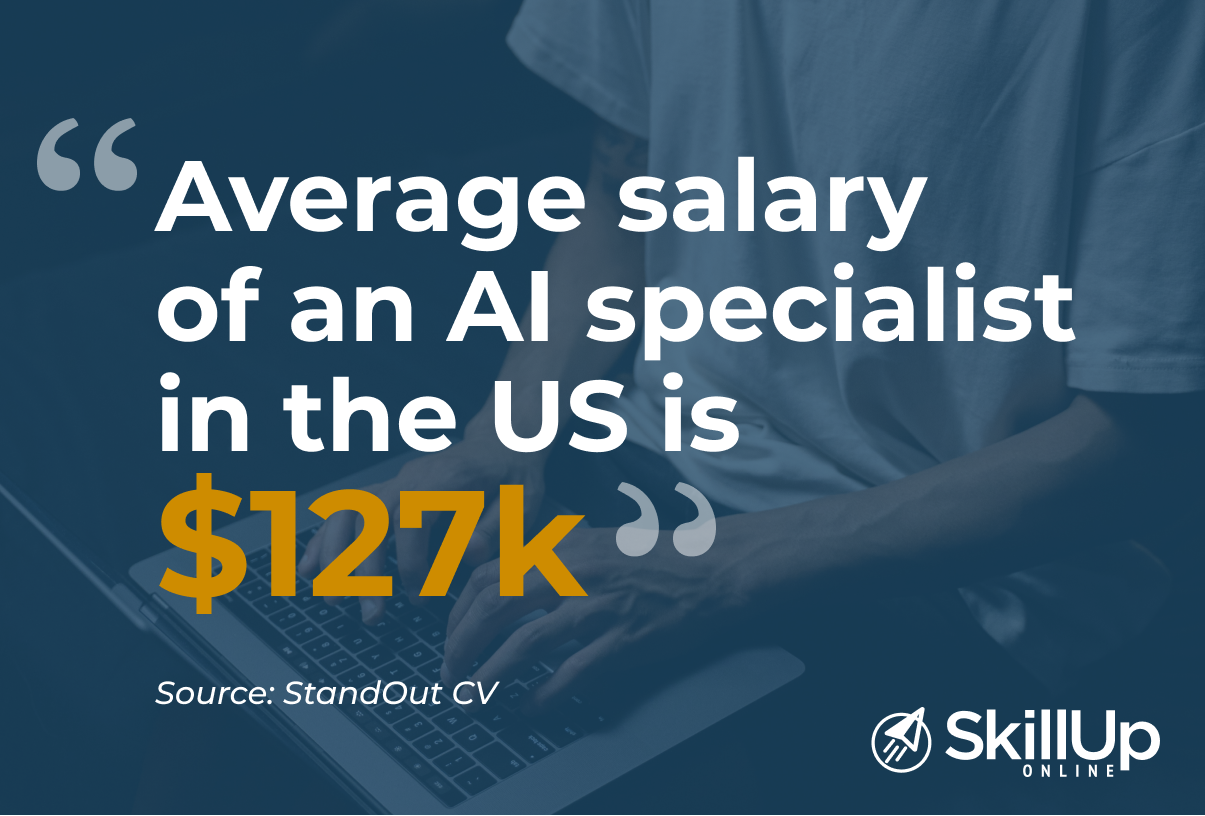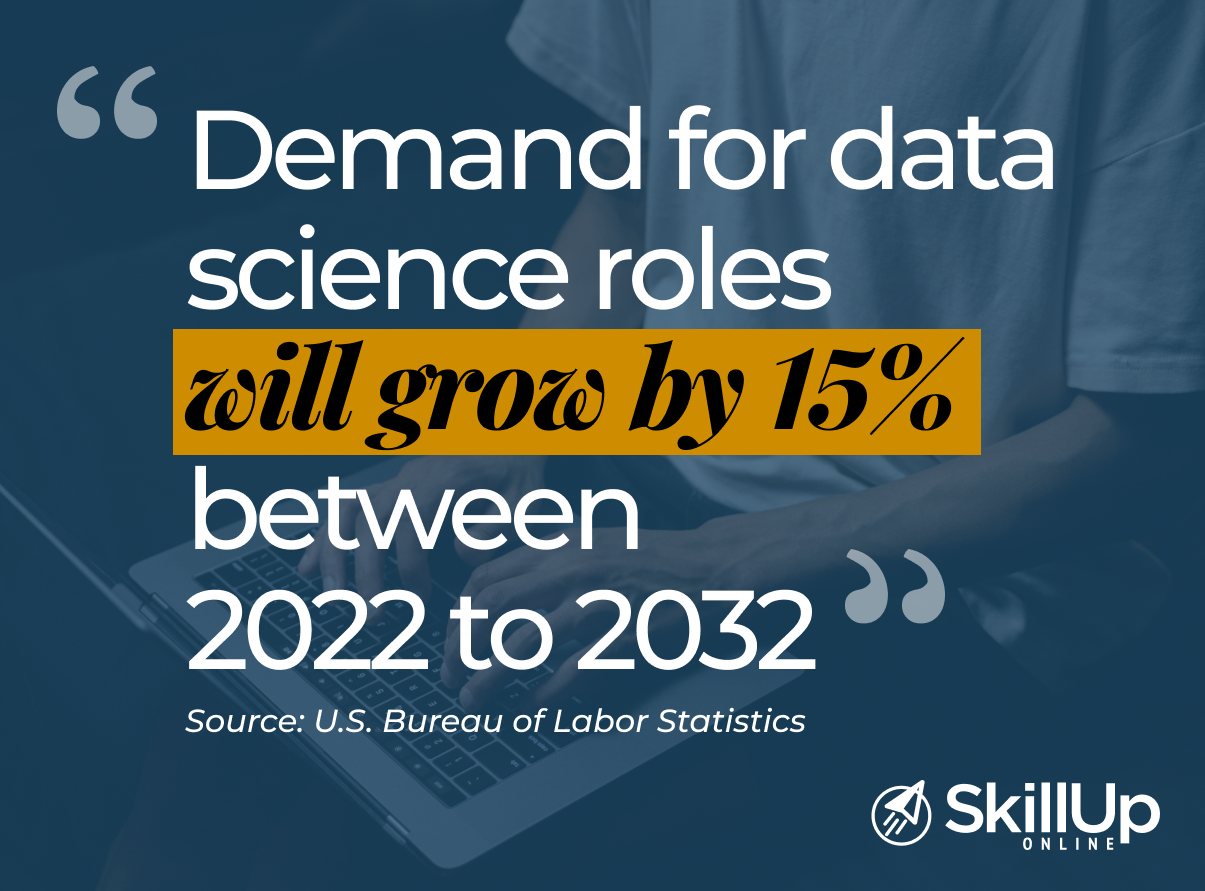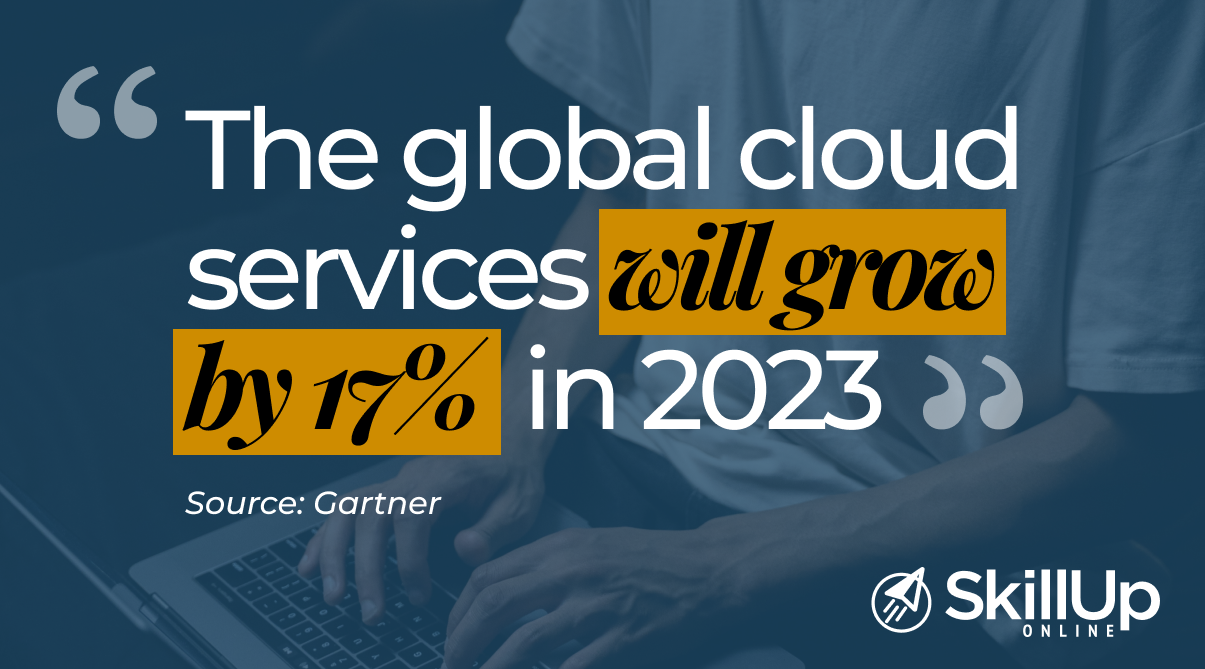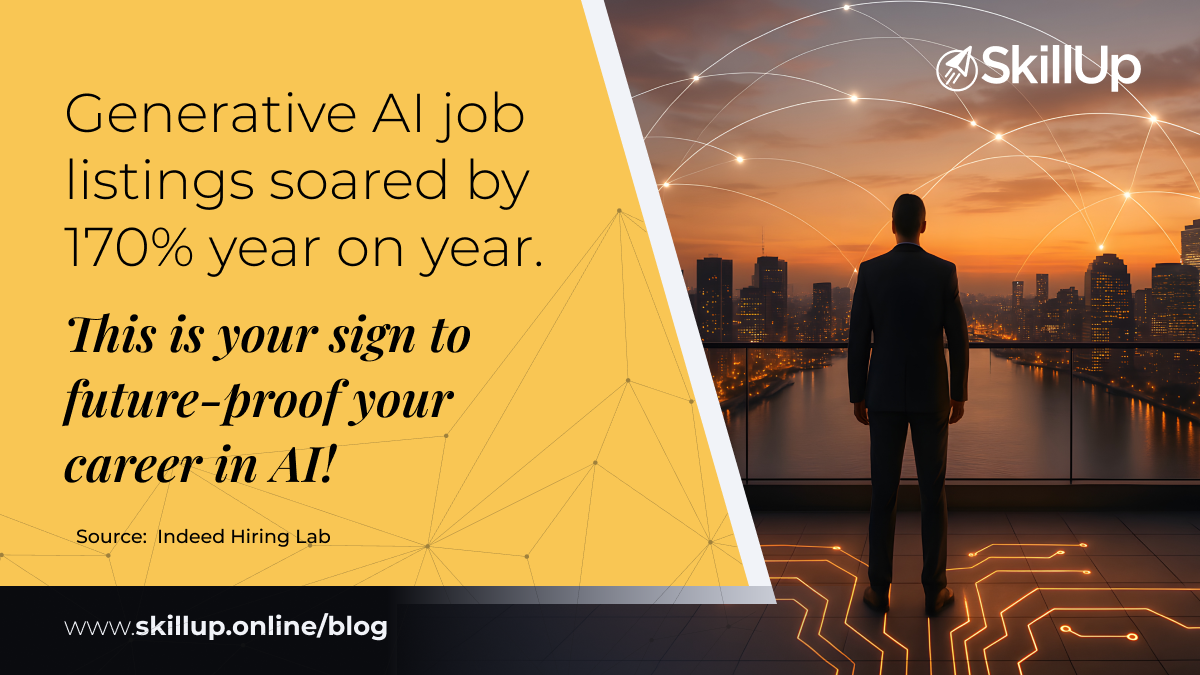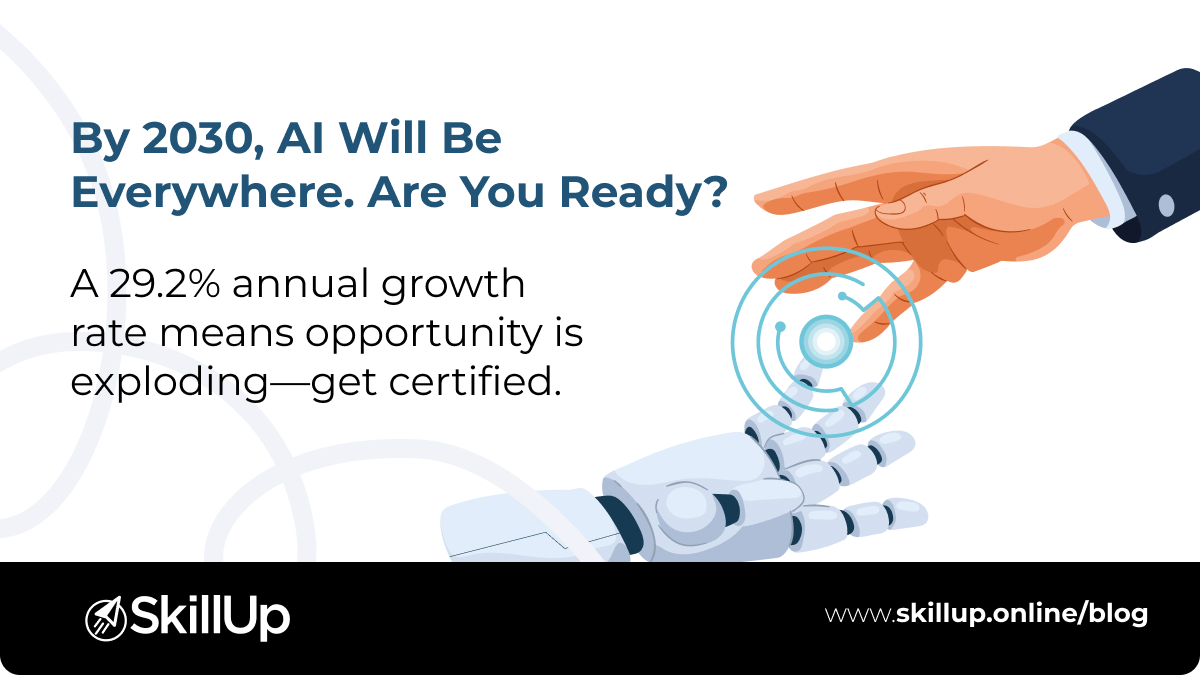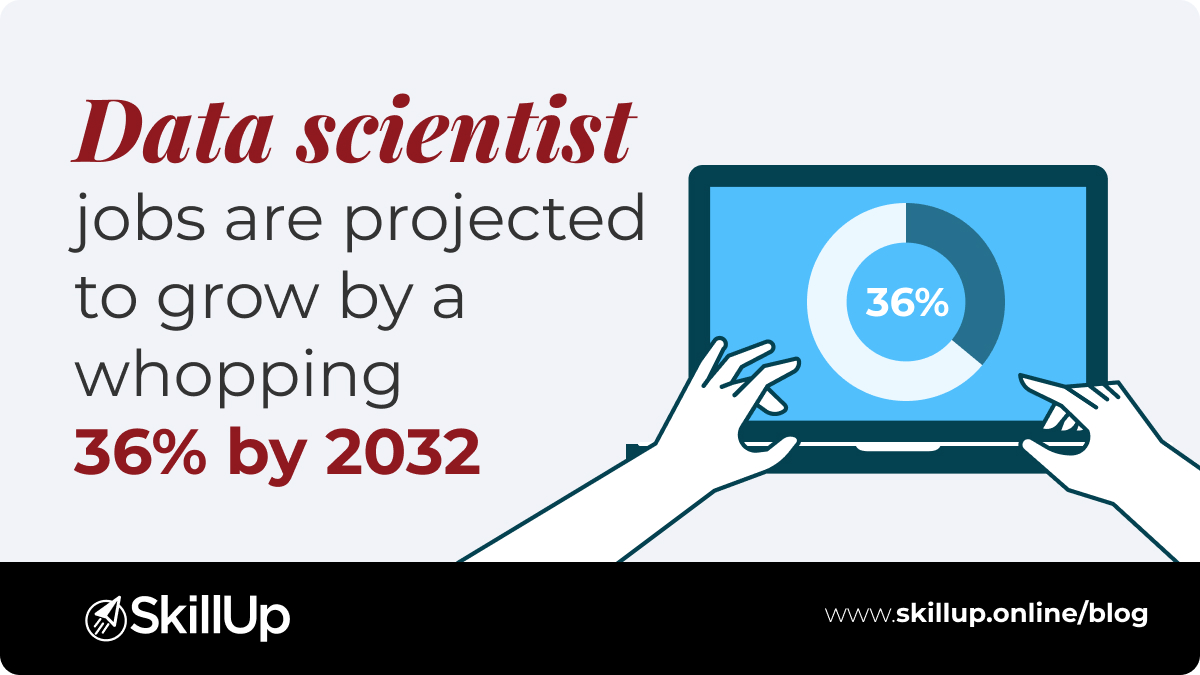In a world where artificial intelligence (AI) is revolutionizing industries and fueling exponential growth, securing an AI certification can be your golden ticket. It’s the key to validating your skills and propelling yourself in the fiercely competitive job market. But with so many tech certifications available, how do you determine which one truly holds value?
According to a study by Global Knowledge, 85% of IT professionals in the U.S. hold at least one certification. So, what sets AI certification apart from the rest?
This blog aims to help you navigate the intricate world of tech certifications, focusing particularly on artificial intelligence (AI) and how it stacks up against other popular tech disciplines. In the coming sections, we will explore AI, data science, cybersecurity, cloud computing, and blockchain.
AI Certification: An Overview
What Is AI Certification?
AI certification is a formal recognition that validates your knowledge, skills, and expertise in artificial intelligence. Unlike traditional education, certification is highly specialized and focuses on practical, hands-on training. It ranges from understanding the fundamentals to mastering complex algorithms and models. If you’re just starting, opting for AI for Everyone: Master the Basics course will provide you a strong foundation in AI.
Who Benefits from AI Certification?
AI certification is versatile, benefiting a broad spectrum of professionals—software engineers, data analysts, and even business leaders who want to leverage AI for decision-making. If you’re considering a comprehensive career path in AI, check out TechMasters Certificate Program in Data Science & Artificial Intelligence. This 11-month program will provide you a comprehensive growth path from the fundamentals to an advanced level of skilling across AI and data science.
Market Demand: How AI Stacks Up
The demand for AI skills is soaring. According to a report by LinkedIn, AI specialists rank among the fastest-growing jobs, seeing a 74% annual growth rate. In the U.S., the average salary for an AI specialist is around $127,380, underlining the high demand for this skill set.
AI is currently the fastest-growing segment compared to other growth domains such as data science, blockchain, or even machine learning. For example, AI is expected to be a $299.64 Billion industry while blockchain is only expected to be around $39.5 Billion by 2025. Likewise, data science, which is closely linked to AI, is expected to be about $178 Billion.
Data Science Certification: The Data Perspective
What Is Data Science Certification?
Data science certification authenticates your data manipulation, analytics, and visualization abilities. It involves a well-rounded skill set, including statistics, programming, and domain-specific knowledge.
Comparing Skills: Data Science vs. AI
While both fields intersect, data science leans towards data analytics and pattern recognition, whereas AI is focused on creating self-learning algorithms. For instance, data science might identify customer trends, while AI automates responses to customer behaviors. If you want to specialize in machine learning, a subset of AI, opting for Deep Learning with TensorFlow course can be a great starting point.
U.S. Job Market: Demand and Opportunities
According to the U.S. Bureau of Labor Statistics, employment in data science roles is projected to grow 15% from 2022 to 2032, faster than the average for all occupations. The median annual wage for data scientists in the U.S. was about $143,997. If you want to understand what career paths data science offers, our blog, Should I Choose a Career in AI or Data Science? can offer some insights.
Cybersecurity Certification: The Security Angle
What Is Cybersecurity Certification?
Cybersecurity certification validates your expertise in protecting an organization’s data and infrastructure from cyber threats. The certification encompasses a range of competencies, from ethical hacking to network security.
Skillsets: Cybersecurity VS AI
While AI aims to create machines to learn and make decisions, cybersecurity is about building secure systems. However, AI technologies are increasingly adopted in cybersecurity for predictive threat analysis. If you’re aiming to develop specialized skills in AI for cybersecurity, consider taking AI-102 Designing and Implementing a Microsoft Azure AI Solution course.
Career Paths: U.S. Opportunities and Compensation
According to a Cybersecurity Ventures report, 3.5 million unfilled cybersecurity jobs will be globally by 2023. Within the U.S., the average annual salary for cybersecurity professionals is approximately $102,202. To understand the evolving role of IT and AI in Cybersecurity, check out our blog on IT and the AI Revolution: What’s Next for Tech Professionals.
What Is Cloud Computing Certification?
Cloud computing certification validates your expertise in deploying, managing, and operating scalable cloud-based systems. From storage solutions to complex architectures, this certification covers it all. Our AI-900 Microsoft Azure AI Fundamentals course can be a great starting point for leveraging cloud computing within AI projects.
Overlapping Skills: Cloud Computing and AI
Cloud computing and AI often go hand-in-hand. Cloud platforms offer the computational speed and storage solutions that AI applications require. If you’d like to learn Python for data science, AI, and cloud computing, take Python for AI and Development Project, which covers both topics.
Industry Adoption: U.S. Trends and Growth
According to a Gartner report, the global cloud services market is expected to grow 17% in 2023, with a substantial chunk of that in the U.S. For a comprehensive view of how AI shapes this trend, refer to our blog post- IT and the AI Revolution: What’s Next for Tech Professionals.
Blockchain Certification: The Disruptive Edge
What Is Blockchain Certification?
Blockchain Certification empowers you to master securing digital transactions via distributed ledgers. This technology is the backbone of cryptocurrencies but extends well beyond, including applications in smart contracts, decentralized finance, and verified credentials such as certifications.
Common Ground: AI and Blockchain
AI and blockchain often collaborate to create transparent, secure, automated solutions. Whether it’s in healthcare or finance, these technologies are disrupting traditional methods of operation. The U.S. has a burgeoning market for blockchain experts, particularly in fintech, healthcare, and supply chain management. Coupled with AI, the possibilities are truly endless.
Investment and ROI: Cost-Benefit Analysis
Cost of Certification: AI vs. Other Tech Certifications
Most AI certifications can range from $1500 to $5,000, depending on the course and the institution. In comparison, a data science certification can cost between $1500 to $4000, and a cybersecurity certification can range from $10,000 to $20,000 depending on whether it’s a boot camp, online or advanced certification. Considering these costs is crucial, especially when planning a career transition or advancement.
Return on Investment: Salary and Job Prospects in the U.S.
According to Glassdoor, AI engineers in the United States have an average annual salary of $141,637. Data scientists earn around $144,213, and cybersecurity experts can expect approximately $106,266.
Decision-Making Criteria: How to Choose
Assessing Your Fit
Before embarking on a certification journey, it’s pivotal to gauge if it aligns with your professional aspirations and skills. Asking yourself relevant questions will help you arrive at the right certification that you should take. To help you in this process, see some sample questions you could ask yourself.
Read each question thoughtfully and select the answer that best resonates with you. Take your time; this is about your future, after all.
Ques. Which technology sector interests you the most?
a) AI and machine learning
b) Data science
c) Cybersecurity
d) Cloud computing
e) Blockchain
Ques. How comfortable are you with coding?
a) Very comfortable
b) Somewhat comfortable
c) Uncomfortable
d) I have never coded before
Ques. What’s your primary career goal?
a) Quick job placement
b) Long-term career growth
c) Becoming a specialist in one area
d) Starting my own tech company
Ques. How important are soft skills to you?
a) Extremely important
b) Important but not a deal-breaker
c) Somewhat important
d) Not Important at all
Ques. What’s your preferred learning style?
a) Self-paced online courses
b) Instructor-led online sessions
c) Traditional classroom setting
d) A mix of different formats
Your answers to the sample questions above will give you a clearer picture of what you seek regarding your career. It’ll help you understand your existing interests, your ideal learning style, and your comfort in learning programming. This will help you frame the perfect learning path and certification goals.
Your Career Goals: Where Do You See Yourself?
The first and foremost step in choosing a certification is identifying your career goals based on your interests. If playing with data excites you, you could pursue a learning path in data science. However, if its managing and preventing cyber-attacks that interest you, a career in cybersecurity would be the apt choice to make. Likewise, if creating self-learning algorithms which can help make human like decisions is what you see yourself doing, then a career in AI and machine learning is what you should opt for.
Individually, each domain – AI, data science, cybersecurity, or even blockchain is a growth segment with its own promising future. Your choice of career should determine the certification you take up.
With an array of certifications available, making a choice can be overwhelming. But remember, the right certification for you hinges on your career goals, industry needs, and the time and financial commitment you can make.
For those looking to go beyond the scope of this article, you can explore SkillUp Online’s blogs like How to Start Your AI Career or Should I Choose a Career in AI or Data Science? to deepen your understanding of AI and other future technologies.
If you want to know more about choosing the right certification, contact our Learner Support Team at [email protected]. They will be more than happy to guide you on your next steps.
SkillUp Online
